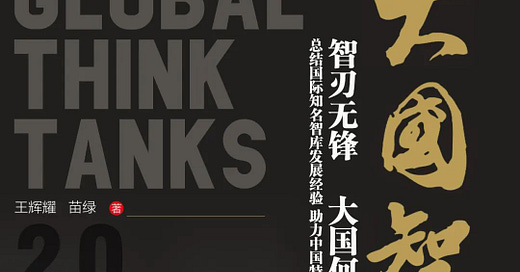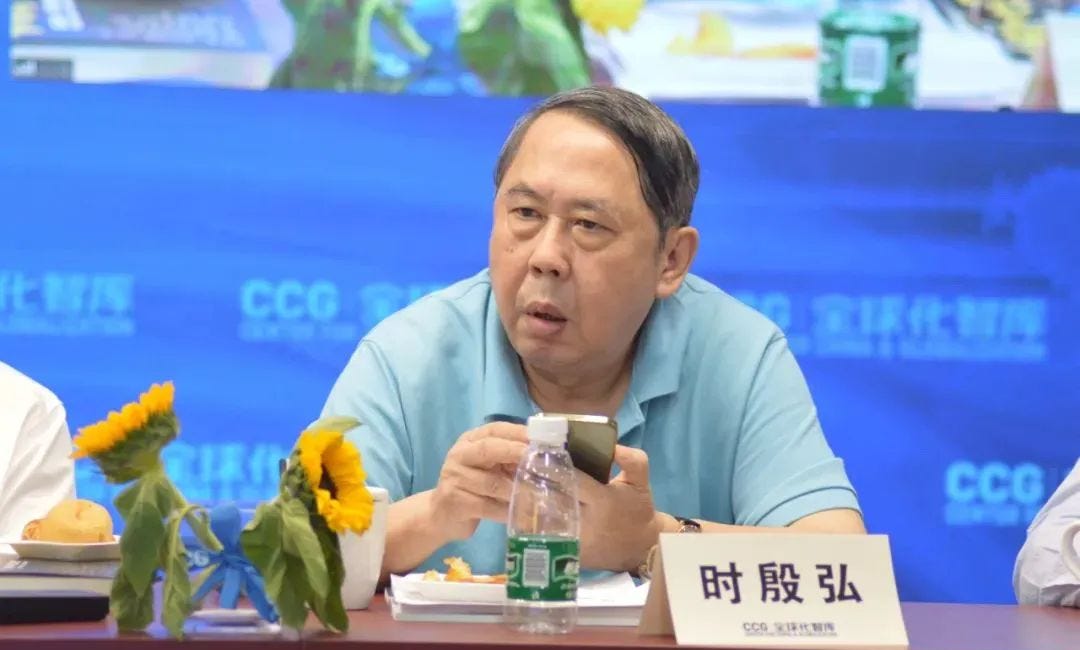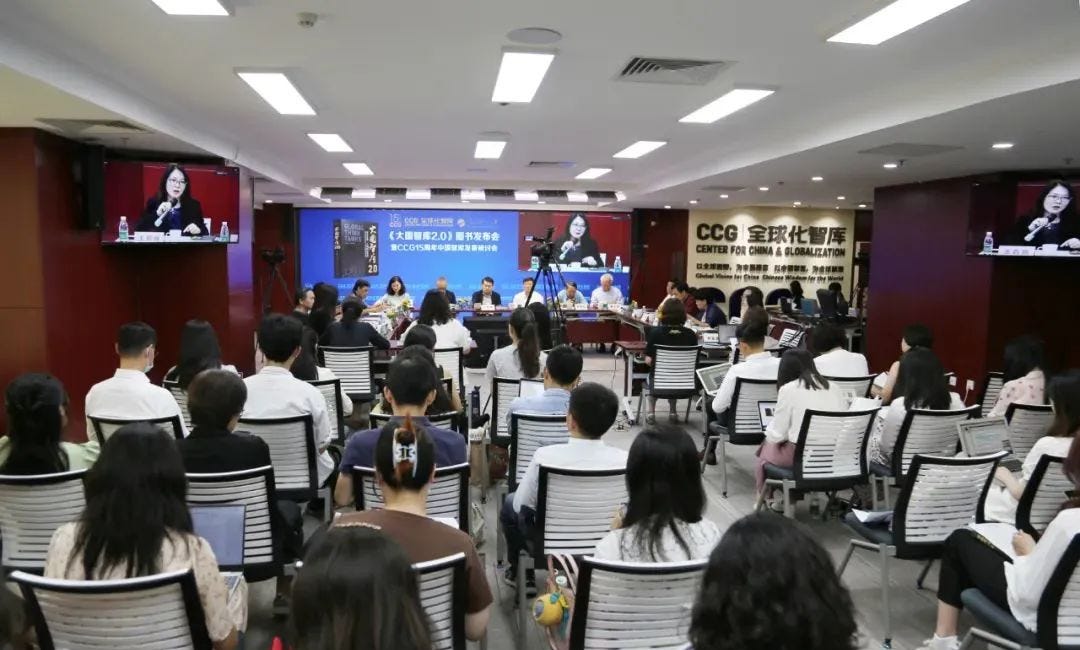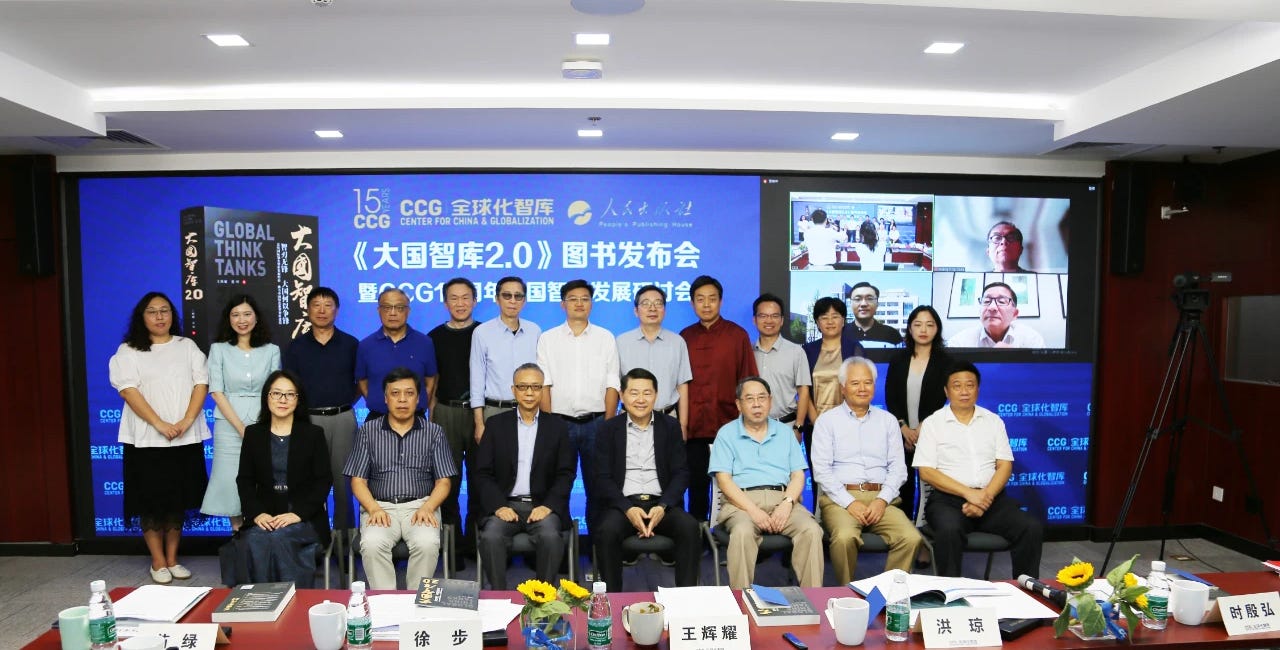Think Tank Taxonomy: a three-pillar landscape of Chinese think tanks
Global Think Tanks (2.0) offers a 101 guide to various categories of think tanks in China: governmental, university-affiliated, and non-governmental.
Global Think Tanks (2.0), written by Henry Huiyao Wang, President of Center for China & Globalization (CCG) and Mabel Lu Miao, Secretary-General of CCG, delves into the mission, challenges, and future development of Chinese think tanks against complexities in the international arena.
The book is published by 人民出版社 the People's Publishing House. A book release, hosted by CCG on August 18, 2023, featured a seminar of leading figures from Chinese think tanks and renowned experts and scholars in globalization research.
The following excerpt is a translated chapter from Global Think Tanks (2.0), titled "Development Pattern of New-Type Think Tanks with Chinese Characteristics." It provides an account of the various categories of think tanks in China, their distinctive features, and a brief historical overview.
There are numerous think tanks in China, each characterized by distinct types and models. Due to the absence of standardized classification criteria, there have also been numerous categorization methods for these think tanks within China's academic community. The simplest approach would be to distinguish between governmental and non-governmental think tanks, yet this broad categorization may overlook important subtleties.
A more nuanced approach is the "three-part classification," which recognizes three categories: governmental, university-affiliated, and non-governmental think tanks. However, even this can be further refined. By considering the specific characteristics of semi-governmental, corporate, commercial think tanks, as well as non-profit research institutions and consultancies, the classification can extend to four or five categories, or even more.
For the convenience of summary, this book adopts the "three-part classification" approach to categorize think tanks in China — that is, they are grouped into three categories: governmental, university-affiliated, and non-governmental think tanks. Each of these categories has its unique features, together forming the foundational "three pillars" of China's think tank landscape.
Since the 18th National Congress of the Communist Party of China (CPC), the construction of new-type think tanks with Chinese characteristics has entered the "fast lane," and the overall development of Chinese think tanks has shown a thriving scene of diverse growth, competition, and collaborative development.
Governmental Think Tanks: Dominant Power
Governmental think tanks encompass fully governmental and semi-governmental think tanks, which are categorized together because of the lack of clear boundaries between them and of their essentially similar nature.
Governmental think tanks are research institutions that are either part of the state apparatus or public institutitons with legal personalities, focusing on policy research and consultancy. Most think tanks founded in the early years of the People's Republic of China fall into this category. This was largely due to China's planned economy, where think tanks were typically integrated into the state. Presently, with reforms in some governmental entities, there has been a rise in the number of public institution-type think tanks.
Research institutions within the state apparatus are the most fully governmental think tanks, as their staffing and operation are completely funded by the state budget, they are integrated into the administrative mechanisms of national authorities, and their researchers are typically part of the national civil service. For example, the Research Office of the State Council and the Counsellor's Office of the State Council serve as the direct think tanks for the Chinese government, providing "decision consultancy, policy recommendations, and state affairs reference" to the main leadership of the State Council. Shortly after the establishment of the People's Republic of China, the China Institute of International Studies, which is affiliated with the Ministry of Foreign Affairs, was founded as a think tank primarily focused on foreign relations. In the early 1980s, the Development Research Center of the State Council, under the auspices of the State Council, was established as a large-scale think tank with the characteristics of a governmental administrative institution.
Public institution-type think tanks emerged during public institution reforms in China's reform and opening up. In fact, it wasn't until the reform and opening up that significant changes occurred to public institutions, which were traditionally part of government in the planned economy. The "Interim Provisions on the Registration of Public Institutions" in 1998 defined public institutions as social service organizations established for public welfare purposes by state organs or other organizations using state-owned assets; they were to engage in activities such as education, science and technology, culture, health, etc. Among these public institutions that are recognized as legal persons, those specifically engaged in policy research and advisory work also fall under the category of governmental think tanks.
Public institution-type think tanks, when compared with fully governmental think tanks operating within the administrative framework, demonstrate semi-governmental traits to a certain extent. Despite heavy reliance on government financial appropriations and primary responsibilities of providing decision consulting and intellectual support to relevant authorities, they also conduct independent academic research. Examples of such semi-governmental, public institution-type think tanks include the Chinese Academy of Social Sciences (CASS), the Chinese Academy of Sciences (CAS), and the Chinese Academy of Science and Technology for Development (CASTED).
Currently, governmental think tanks are the main force in China's think tank landscape, playing a significant role in major decision-making and reforms in China. Being within the state apparatus provided them with institutional ties to the government and direct access to central government and CPC leadership, allowing their research findings to influence government decisions. Their policy recommendations often find their way into key documents such as Party Congress reports, CPC Central Committee meetings, five-year plans, and government work reports. The "383 Scheme" submitted to the Third Plenary Session of the 18th Central Committee of the Communist Party of the CPC by the Development Research Center of the State Council serves as a prominent example, illustrating the influential role of governmental think tanks in policy research.
In 2015, China initiated a pilot program for the construction of high-end think tanks and selected a total of 29 think tanks as national high-end think tank pilot projects in 2015 and 2020. These think tanks can be categorized into four types:
9 comprehensive research institutions under directly uner the CPC Central Committee, the State Council, and the Central Military Commission.
17 specialized think tanks affiliated with universities and research institutions.
1 research institution affiliated with a major state-owned enterprise (SOE).
2 non-governmental think tanks
It is evident that the national high-end think tanks primarily involves governmental or semi-governmental think tanks. Governmental think tanks, therefore, hold a dominant position in the development pattern of new-type think tanks with Chinese characteristics.
After the implementation of the "Management Measures for National High-End Think Tanks (Trial)" and the "Management Measures for Special Funds of National High-End Think Tanks (Trial)," various pilot programs have continuously explored and reformed in terms of institutional development, talent utilization, fund management, international cooperation, and more.
For example, the CAS established the Institutes of Sciences and Development (CASISD), which is an independent legal entity, in an effort to build a specialized think tank system. CASISD is headed by its president and is further organized with its own academic committee and advisory committee. It is divided into five main sections: Functional Departments, Research Divisions, Support Centers, Research and Higher Education Integration, and Information Network and Dissemination. By coordinating resources both within and outside of the CAS, CASSID has nurtured professional core research teams, visiting research teams, and networked collaborative research teams, establishing a talent pool characterized by a "small core, extensive network" pattern.
University-Affiliated Think Tanks: Important Force
University-affiliated think tanks refer to various research institutes, centers, or entities hosted by universities. They are academic-oriented and hold a unique position within China's vast think tank landscape. These university-affiliated think tanks can vary significantly in their research focus, with some focusing on academic research and some on policy impact. They also exhibit significant variations in their dependencies. Some may resemble semi-governmental think tanks, while in others, they may align more with non-governmental think tanks.
University-affiliated think tanks are widely present in research-oriented and well-known universities in China, often established with the collaboration of universities and other institutions or groups. The funding for these think tanks typically comes from their creators, including university allocations, foundations, corporate sponsorships, or private donations. The researchers at university-affiliated think tanks are primarily university faculty members from various academic disciplines, but they may also include researchers hired from other universities and research institutions, with a primary focus policy-related research.
University-affiliated think tanks are usually directly affiliated with universities and can leverage academic resources extensively, offering ample room for both in-depth and wide-ranging research. And their researches always come to more scientific conclusions.
Unlike governmental think tanks, university-affiliated think tanks lack the authority to independently sign contracts with entities outside the university and cannot independently account for finances. They also lack legal personalities due to universities' preference for centralized management in pursuit of greater convenience and efficiency.
It is challenging to provide an accurate count of university-affiliated think tanks due to their substantial number and the fact their registration and oversight do not fall under any national administrative departments.
The influence of university-affiliated think tanks is closely related to the research capabilities of the universities themselves. Therefore, they are generally affiliated with prestigious research-oriented or comprehensive universities that offer an excellent environment characterized by a high concentration of top-tier talent, distinct academic strengths, rich resource collections, and a vibrant academic research atmosphere.
For example, among the university-affiliated think tanks selected for the national high-end think tank pilot projects, eight institutions are affiliated with top-tier universities enlisted in the Double First Class University Plan, including Peking University, Tsinghua University, Renmin University of China, Fudan University, Wuhan University, Sun Yat-sen University, Zhejiang University, and Beijing Normal University.
The China Center for Economic Research (CCER), now known as the National School of Development at Peking University, was established in August 1994. It was founded by a group of distinguished scholars with overseas educational backgrounds, including Justin Yifu Lin. The center's primary research areas include economic management theory and major issues in various fields of China's economic reform and development. Policy research is often conducted in fields closely related to academics, such as population studies, which can be directly translated into policy research. CCER is known for its wide network, sensitivity to real-world issues, and strong academic foundation. Its publication, the "China Economic Quarterly," has a strong academic and professional impact. Additionally, the center hosts high-level international academic exchange activities, such as the "U.S.-China Economic Dialogue," and actively engages in international collaborations.
The National Academy of Development and Strategy (NADS) at Renmin University of China was established in June 2013 as an entity directly under the university. Its research areas primarily focus on economic governance and development, political governance and legal construction, and social governance and social innovation. NADS has become a heavyweight think tank team in the fields of national ideology, administrative system reform, economic governance, and social governance.
The Institute of Guangdong, Hong Kong and Macao Development Studies, Sun Yat-sen University was founded in 2015. It is a multidisciplinary and comprehensive academic research institution with unique advantages. The center utilizes national "985" and "211" projects, along with domestic and international research initiatives, as bridges, serving as a talent pool, information center, and national decision-making advisory think tank for research related to Hong Kong, Macao, and Taiwan. Based on its basic judgments about the political situation in Hong Kong and Macao, the academy regularly publishes the "Hong Kong and Macao Situation Report."
China Institute, Fudan University was established in 2015 through the merging of the China Development Model Research Center and the New Political Economy Research Center at Fudan University. The institute primarily organizes a series of China research activities, including the China Development Model and China Discourse High-End Forum, high-end training courses, Chinese studies graduate courses, theoretical websites, and the publication of the China Discourse series. It provides a platform for scholars and individuals researching China's path, model, and discourse to learn and exchange ideas.
University-affiliated think tanks not only engage in policy and theoretical research, leveraging their resources and talent advantages, but also play a crucial role in advising government decision-makers at various levels and in different sectors. As university-affiliated think tanks continue to develop, various levels of government increasingly value their role. These think tanks can contribute to government decisions in two ways: many university experts and scholars serve as advisors in government decision-making processes; and government agencies often consult university-affiliated think tanks to enhance the scientific basis of their major decisions.
Compared to governmental and non-governmental think tanks, university-affiliated think tanks have unparalleled advantages, and their influence on decision-making and society is growing. On the one hand, university-affiliated think tanks benefit from a more vibrant research atmosphere compared to governmental think tanks and enjoy greater autonomy in research directions and fields. On the other hand, compared to non-governmental think tanks, university-affiliated think tanks have access to stable funding from the government, which provides an economic foundation for their independent and long-term research.
As a result, these think tanks, with the the brand effect of universities and their strong research capabilities, have a significant advantage in securing research projects and are experiencing positive growth trends.
Non-Governmental Think Tanks: Emerging Player
The "Several Opinions on the Healthy Development of Non-Governmental Think Tanks" defines non-governmental think tanks as non-profit research and consulting organizations hosted by domestic non-governmental forces with primary focus on strategic issues and public policies; their mission is underpinned by the principle of serving the Party and government in scientific, democratic, and lawful decision-making; they take the form of non-governmental organizations, social service agencies, foundations, or other entities with legal personalities.
In the context of China's reality, some private consulting organizations mainly exist in the form of commercial consulting firms but also encompass some think tank functions. In this book, we consider them as part of non-governmental think tanks.
The real development of non-governmental think tanks in China began in the 1990s. After the 14th National Congress of the CPC, thanks to the establishment and improvement of the market economy system and the gradual transformation of the functions of the Chinese government [from management to service], a large number of non-governmental think tanks emerged. These include China Development Institute (Shenzhen), China Institute for Reform and Developmet(CIRD), Horizon Research Consultancy Group, Great Wall Enterprise Institute, Shanghai Huaxia Institute for non-governmental Development, and more.
In recent years, with increasing attention paid from Party and government leadership, non-governmental think tanks have entered another phase of development, giving rise to a new generation of non-governmental think tanks. In particular, since General Secretary Xi Jinping issued important instructions on "building new-type think tanks with Chinese characteristics" and the Third Plenary Session of the 18th Central Committee of the CPC proposed "We should strengthen the construction of new-type think tanks with Chinese characteristics and establish a sound decision-making consulting system," China's non-governmental think tanks have entered a new era of significant development and prosperity. Some active examples include the Center for China and Globalization (CCG), China Finance 40 Forum (CF40), Charhar Institute, ChangCe Think Tank, Pangu Think Tank, Chinese Economists 50 Forum (CE50), Taihe Institute, Intellisia Institute, Liao Wang Institution, Chengdu Institute of World Affairs, and others.
Currently, non-governmental think tanks exist in various forms, including corporate legal entities (企业法人), non-enterprise private entities (民办非企业 ), non-governmental organization legal entities(社会团体法人), and foundations(基金会).
Corporate legal entity think tanks refer to organizations registered as legal entities under the form of enterprises that specialize in policy research and consulting, e.g. ANBOUND, Pangoal Institution, Grandview Institution, Changce Think Tank, Taihe Institute, Forecast Thinktank, Hongfan Legal and Economic Studies, Horizon, MYCOS, Tencent Research Institute, etc.
According to the "Interim Regulations on Registration Administration of Private Non-enterprise Units" (1998), "Private non-enterprise organizations referred to in these Regulations are defined as non-governmental organizations which are established by enterprises, institutions, associations or other civic entities as well as individual citizens using non-state assets and conduct not-for-profit non-governmental service activities." Non-enterprise private entity legal think tanks include institutions like the China Institute for Reform and Developmet(CIRD), Great Wall Enterprise Institute, Wanbo Institute, Knowfar Open Source center, 21st Century Education Research Institute, Fangdi Think Tank, Beijing Institute of Urban Development, and others.
Non-governmental organization think tanks refer to non-profit, non-governmental organizations formed voluntarily by Chinese citizens to engage in policy research, consulting, non-governmental surveys, and industry analysis work in accordance with their charters to achieve the common wishes of their members, e.g. Insurance Society of China, China Fiscal Association, China Research Society of Urban Development, Urban Planning Society of China, China International Association for Urban and Rural Development (CIAD), Chinese Association of Development Strategy Studies, etc.
As a rising player in China's think tank landscape, non-governmental think tanks play an irreplaceable complementary role to the governmental think tank system and constitute the "other half of the brain" of China's marketplace of ideas. In May 2017, the Ministry of Civil Affairs, the Publicity Department of the CPC Central Committee, the Organization Department of the CPC Central Committee, and six other departments jointly issued the "Several Opinions on the Healthy Development of Non-Governmental Think Tanks," which laid out a series of arrangements to regulate and guide the healthy development of non-governmental think tanks. This marked the beginning of a new stage in the development of non-governmental think tanks in China.
CCG Update has also covered the book release of Global Think Tanks (2.0) on August 18, 2023, which featured leading figures from Chinese think tanks and renowned experts and scholars in globalization research:











